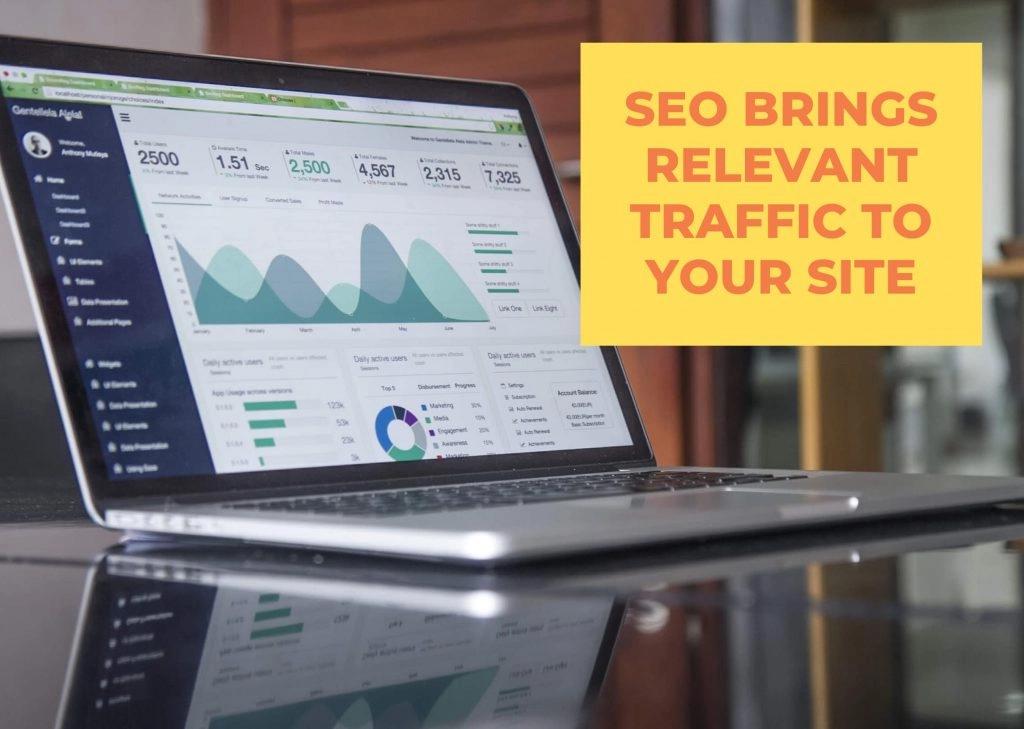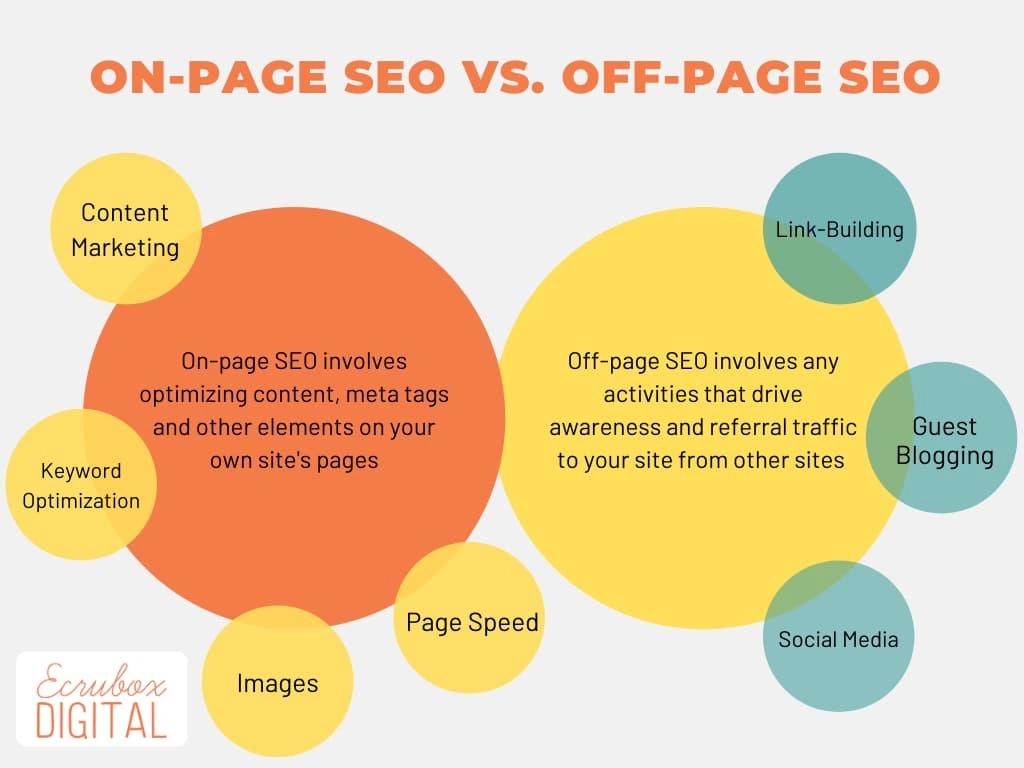30 Second Summary:
- SEO is all about increasing your website’s visibility in organic search results. Unlike paid ads, it’s a long term strategy with long term rewards. SEO is made up of on-page, off-page and technical tactics.
- Organic search refers to unpaid search results that appear based on ranking factors determined by a search engine’s algorithm.
- The benefits of SEO optimisation include high-quality traffic likely to convert, more clicks through to your website and strengthening of your overall marketing efforts.
- SEO does work if the right people do the job properly. Not every SEO tactic will work for every company.
If you have a website for your business and you are curious about how SEO can help you grow your online presence, then you should get to grips on the basics of SEO. Learning how it works will enable you to see the value of your website so you can maximise its potential. At Ecrubox we are always willing to help our clients understand SEO inside and out - so let us share some nuggets of knowledge with you so you can get to grips with this area of digital strategy. Let’s start at the beginning.
What actually is SEO?
We know, SEO sounds like a very important person - but in fact, it’s actually part of a wider digital marketing strategy. The abbreviation stands for Search Engine Optimization and it is the process of increasing your website’s performance in organic search results; through tactics that improve your visibility to search engines, and then essentially users.

So, how does organic search work?
Organic search refers to the unpaid search results you see when you search for a query using a search engine. Basically, it’s the results that do not include any ads. The results that do appear are based on relevance to the search query and a whole load of other ranking factors… but we haven’t got to that bit yet.
When talking about SEO strategy, and actions that are carried out to improve organic search results - it’s best to split them up into different categories:
- On-page SEO - this is the process of making improvements or what we like to call (optimisations) on your website.
- Off-page SEO - this consists of ‘behind the scenes’ tactics that are carried out away from your website.

Aside from that, we also like to categorise some actions into what we call ‘Technical SEO’. This consists of all the ‘technical tinkering’ that is carried out in the backend of your website CMS.
Essentially all these strategies combined work together to make your site more trustworthy and relevant in the eyes of Google, which makes its algorithm more likely to present the site to users who are searching.
For example, say your website has lots of unoptimised, large images slowing down your site and your competitor’s site has compressed images and relevant ALT text - Google might be more inclined to present your competitor’s site because it is better optimised.
However, there are many ranking factors that determine which websites rank above one another. So it's good to have an idea of these - here is a rundown of the top 8:
- A Secure and Accessible Website (HTTPS)
- Page Speed on Desktop + Mobile
- Mobile Friendliness
- Domain Age, URL, and Authority
- Optimised Content
- Technical SEO
- User Experience
- Links
What are the benefits of SEO optimisation?
1. You don’t need to worry about paying or creating any ads
SEO is a different ball game from paid advertising, you don’t need to worry about ad spend, budgets or optimising your paid campaigns - the focus should be around how you can bring people to your website by making it better! The investment here is for the time needed to carry out your SEO tactics. Depending on your business you might need researched content, on-page and technical optimisations or a link building strategy.
Unlike paid campaigns, once you start seeing increases in organic traffic you don’t need ongoing costs (like budget or CPC) to keep it up. As long as you monitor and maintain your site you can still continue to get ‘free’ clicks in search results. What’s even better? These clicks are high-quality.
2. It brings extremely relevant traffic to your site
One of the biggest benefits of SEO is its ability to bring in interested users to your site - this is because SEO is an acquisition channel that is part of a wider inbound marketing strategy. It’s a lot more customer-centric than traditional marketing efforts - what do we mean by that? Instead of pesky ads between news articles - SEO is about providing useful content for users and resources than can genuinely help them. When you focus on this in relation to your products and services you’ll get better at attracting the right audience.
If you think about it, customers are less likely to get annoyed by SEO articles, as they are not intrusive but instead, helpful. And once a user finds their answer to their query in your article, they might be more inclined to go back to your website for more information about that topic - hence building brand awareness.
3. In the long run - SEO can get you more clicks than PPC
We don’t know about you, but we rarely click on the ads at the top of search results. Why? Because we are so aware that someone is paying for them. Our team at the agency may be biased, but it seems many users have the same idea. Research by Zero Limits Web shows 71.33% of searches result in a click on an organic search result on the first page - bypassing paid ads.
Organic search results generally have more visibility in terms of the number of links displayed and other features such as images, videos, knowledge panels - which are known as SERP features. So by investing time and resources into getting your website ranking for relevant terms for your business; you could see organic search bring in, even more, clicks than paid. However, there is no guarantee, SEO can be a waiting game, but if done properly, the results could be substantial.
4. SEO goes hand in hand with PR
You might be wondering what we are getting at here - but believe it or not off-page antics are closely related to PR efforts. Getting links back to your website from authoritative sources is known in the SEO world as link building for outreach. When identifying opportunities to get your brand and website to potential customers, you’ll be able to get more efficient in distributing content to potential customers through other means. Think about it, when researching areas to acquire new links on other websites or publications, you’re also strengthening your existing PR activities. Double win.
Do SEO services really work?

Yes, despite the rumours, SEO is not dead. However, the type of SEO actions that will work best for your business depends on your product, service, industry and of course who you hire to do the job. If you need some advice on the best approach for your business. Drop us an email and we’d be happy to offer some advice.
References: